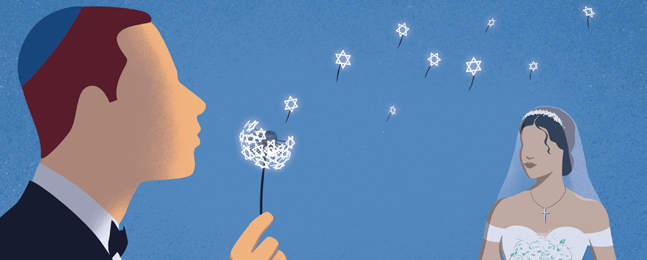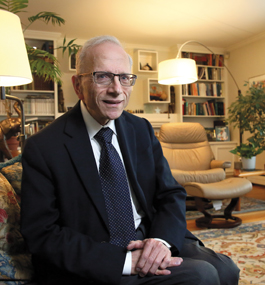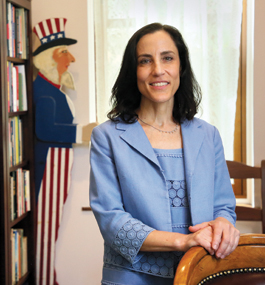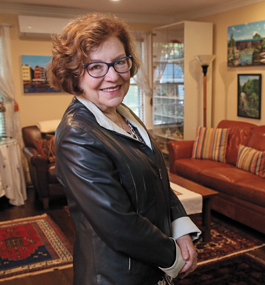Keeping the Faith
Is intermarriage threatening American Judaism or renewing it? Contemporary Jews confront an age-old question — and discover surprising answers.

Davide Bonazzi
by Lawrence Goodman
In 1990, American Jews decided they had no future.
That was the year the National Jewish Population Survey — then the most comprehensive, ambitious study of American Jewry ever undertaken — revealed that more than half of America’s Jews, 52%, were intermarried. Though the report itself was even-keeled in its analysis, the reaction among many Jews veered toward panic. “A second Holocaust” is how one group of Orthodox rabbis described what was happening.
Intermarried couples weren’t raising their children Jewish, according to the NJPS survey. This meant their children’s children wouldn’t be Jewish. It was only a matter of time before American Jews would disappear, the thinking went.
“We are probably witnessing the last generation of Jewish life in America as we now know it,” a leading rabbi wrote in the Los Angeles Times.
Literary critic Leslie Fiedler predicted “an end to a separate Jewish identity, whether defined racially, religiously or culturally.”
And Harvard Law School professor Alan Dershowitz warned that Jews were “in danger of disappearing.” Intermarriage, he wrote, was a “threat to our survival as a people.”
It hasn’t turned out that way.
Recent surveys by Brandeis’ Cohen Center for Modern Jewish Studies and the Pew Research Center show 7.6 million Americans identify as Jewish, a 35% increase since 1990.
Immigration by Jews from the former Soviet Union, Israel and elsewhere accounts for some of the increase.
The other principal cause? Intermarriage. According to Pew, about two-thirds of intermarried couples raise their children Jewish. This means in a typical intermarried family — one Jewish parent and two kids — the Jewish population doubles in a generation. Intermarriage boosting the number of American Jews was not a scenario many doomsayers imagined possible.
This steadfast intergenerational transmission of Jewish identity is all the more remarkable given that, in recent years, Pew has noted a precipitous decline in the numbers of Catholic and Protestant Americans.
Pew also found that roughly 80% of American Jews think caring about Israel is an “essential” or “important” part of being Jewish. Synagogue membership, participation in Jewish organizations, and the observation of Jewish holidays and traditions are all rising. Nearly three-quarters of American Jews say remembering the Holocaust, and leading a moral and ethical life are essential to their Jewish identity. At least half of American Jews believe working for justice and being intellectually curious are similarly essential.
To be sure, a number of scholars are pessimistic about American Jewry’s future. They argue that, although the children of intermarried couples identify as Jewish, they lack the commitment to Jewish learning and culture that previous generations held. Over time, these scholars argue, this will lead to a weakening or a dumbing down of what it means to be Jewish. For many Jews, being Jewish will mean no more than liking Mel Brooks movies and occasionally cooking brisket.
Len Saxe, the Klutznick Professor of Contemporary Jewish Studies, sees it differently and, to anyone still mired in the doom and gloom of the 1990s, offers a corrective. “Judaism and Jewish culture are flourishing,” he says. “American Jews express their Jewishness in diverse ways. But for most, it is a valued part of their identity.”
Beware the outsider
In the beginning (or pretty close to it), Jews worried about intermarriage.
According to Deuteronomy, before the Israelites entered Canaan, God commanded them not to intermarry. Canaan was the land of Hittites, Girgashites, Amorites, Canaanites, Perizzites, Hivites and Jebusites, whom God wanted His chosen people to destroy, not betroth. When the prophet Ezra learns about the growing conjugal ties between the ancient Hebrews and their neighbors, he rends his clothes, tears his hair out and feels “desolate.” He tells his Judean followers not just to avoid outsiders but to “do nothing for their well-being.”

Mike Lovett
Jonathan D. Sarna ’75, GSAS MA’75
page 2 of 4
The Bible itself, though, doesn’t prohibit marriage outside the faith. Rabbis enshrined that ban into Jewish law during Talmudic times, roughly 200-500 C.E. Jewish communities throughout the world were characterized by insularity and inbreeding. Discrimination and oppression meant Jews couldn’t marry non-Jews, even if they wanted to.
But, a few years ago, scientists at England’s University of Huddersfield discovered that, genetically, Eastern European Jews descend from Middle East ancestry on the father’s side and non-Jewish roots on the mother’s. Jewish men likely migrated from Palestine to Europe about two millenniums ago, around the time of the destruction of the Second Temple, and took non-Jews as partners. Ashkenazi Jewry owes its existence to intermarriage.
Jews arrived in America in the 1650s. In the United States, intermarriage was rare through the middle of the 20th century, with rates never rising above 3%. According to University Professor Jonathan D. Sarna ’75, GSAS MA’75, it was mostly men who married out of the faith, largely because more men than women immigrated to America and because women were kept under stricter social control.
Sarna, the Joseph H. and Belle R. Braun Professor of American Jewish History, and director of the Schusterman Center for Israel Studies, points to a singular tension that characterized the attitude of American Jews toward outsiders: They wanted to have close social relations with them, yet not so close that Jews intermarried.
By the 1960s, it became impossible to maintain this balance any longer, he says. As social mores loosened, America became more of a melting pot. Irish, Italians, Catholics, Protestants, Blacks and whites increasingly cohabited. There was no reason the friction between Jews and other groups shouldn’t also ease.
In 1964, when the intermarriage rate had risen to 7%, Look magazine published a cover story on “The Vanishing American Jew.” By the time Look went out of business seven years later, the vanishing Jew was an idée fixe in the public imagination.
Thereafter, as Sarna writes in his book “American Judaism: A History,” “[t]wo interrelated and highly contentious statistics count for Jews above all the rest: their absolute numbers in America and their rate of intermarriage.[…] Jews both obsess over these statistics and berate themselves for doing so.”
Embracing intermarried families
When the NJPS study on intermarriage appeared in 1990, Barry Shrage was three years into his 30-year tenure as head of Combined Jewish Philanthropies of Greater Boston. He says the typical reaction to the NJPS findings was a mixture of panic, despair, rage at the Jews who were supposedly abandoning their religion, and sorrow that their kids would be forever lost to Judaism. The consensus was that everything possible should be done to prevent interfaith marriage.
Yet Shrage’s response at the time was that the train had already left the station. He thought intermarriage was a fait accompli of American Judaism. And he wasn’t fatalistic about the future. Shunning Jews who intermarry and treating them like traitors made it impossible for them to participate in Jewish life, Shrage said. He urged another strategy: make them feel welcome.
In 1997, CJP added to its correspondence and invitations a sentence that encouraged “the participation of interfaith families, couples and significant others in all its activities.” Under Shrage’s leadership, CJP began an intensive adult-education initiative and a program that educated parents about raising their kids Jewish. It also supported the growth of Jewish overnight camps.
He was convinced that exposing intermarried Jews and their children to all Judaism had to offer — including its value system, history, culture and ties to Israel — would keep them connected to their heritage.
“Having a Jewish life makes it possible to find meaning and hope,” says Shrage, now a professor of the practice at Brandeis’ Hornstein Jewish Professional Leadership Program and the head of the university’s Initiative for Jewish Identity. “It’s not a small thing in a world filled with alienation to feel like you belong to a thousands-year-old tradition with an infinite future.”

Mike Lovett
Keren McGinity
page 3 of 4
Other Jewish organizations followed approaches similar to CJP’s. After the Reform Judaism movement began accepting interfaith families as full members, its membership swelled, and it soon displaced Conservative Judaism, which still shunned the intermarried, as the most popular denomination.
“One of the strengths of Judaism historically has been its ability to respond thoughtfully to the realities of societal life,” says Jay Perlman ’91, senior rabbi at Temple Beth Shalom, a Reform congregation in Needham, Massachusetts. “Warmly reaching out to interfaith couples and families, and weaving them into the fabric of the Jewish community are important expressions of the Jewish value of outreach.”
The impact of the growing tolerance toward the intermarried became fully apparent in 2013 when Pew released another survey of American Jews. Nearly two-thirds of intermarried couples were now bringing up their kids Jewish.
In a 2017 paper, Saxe and several colleagues showed that this higher number represented a doubling within the space of a generation. They attributed the transformation, in part, to “the more welcoming and inclusive attitudes and practices toward intermarried families by Jewish organizations.” As Shrage had predicted, Jews who intermarried chose to remain Jewish, given the chance and the right enticements.
Josh Pernick ’10, GSAS MAT’13, until recently the rabbi at Congregation Beth Israel outside New Orleans, reports that, even at his Orthodox synagogue, intermarried Jews remain deeply involved in Jewish life. “There are a lot of people who fall in love with non-Jews but never intended to exit from Jewish communal life,” he says. “A number of our past presidents and some of our most active members are married to non-Jews.”
For more than two decades, Hadassah-Brandeis Institute research associate Keren McGinity has studied what motivates Jews who intermarry to raise their children Jewish. She’s found the decisive factor is the mother’s wishes.
In earlier generations, women who married outside their faith had less influence in determining their children’s religion. But, as McGinity states in her 2009 book, “Still Jewish: A History of Women and Intermarriage in America,” feminism empowered women to remain Jewish and bring their kids up as Jews.
“[T]he high degree of individualism in general American society combined with ethnic revivalism enabled women of Jewish heritage to marry men without religious faith and, paradoxically, to become considerably more Jewish once married,” she writes.
The most recent Pew Report, which came out in 2020, found that children of intermarried parents whose mothers are Jewish were 1.86 times more likely to be raised exclusively Jewish than those whose fathers are Jewish. (Intermarried Jewish men are expected to focus more on breadwinning than on parenting.)
In the propagation of Judaism, women have been both “the deciders and the doers,” says McGinity.
A fraying or a rejuvenation?
American Jews may not have disappeared, but their future is still not guaranteed.
Sylvia Fishman, the Joseph and Esther Foster Professor in Judaic Studies, Emerita, says American Judaism is at risk of becoming bland, superficial and meaningless, an identity in name only, without any corresponding intellectual and emotional commitment.
Fishman says the generation of American Jews she began studying more than two decades ago experienced a profound connection to Judaism. Even if they were not religious, they saw themselves as part of a unique and exalted tradition. They participated in Jewish organizations, and devoted themselves to learning about Jewish history and culture. “They felt their Judaism in their kishkes,” she says, using the Yiddish word for “gut.”

Mike Lovett
Sylvia Fishman
page 4 of 4
But millennials, especially those who grew up in intermarried households, have a much more superficial commitment to Judaism, Fishman says. Their parents didn’t expose them as kids to the richness of Jewish thinking, history and culture.
These millennials “weren’t given the intellectual tools or emotional experiences to know what their Jewish heritage is,” she says. As a result, Jews may not be vanishing, but “Jewish culture is fading from a large segment of the Jewish population.”
For his part, Sarna worries about the growing divide between secular and religious Jews, which he believes is being fueled by intermarriage. According to Pew, about a quarter of Jews today do not identify as Jews by religion. They see themselves as culturally or ethnically Jewish, or Jewish by descent. Compared to religious Jews, they participate less in Jewish organizations and feel less attached to Israel. For them, being Jewish is eating Jewish foods, visiting Jewish historical sites and reading Jewish literature.
Sarna says Pew’s data strongly suggest a large overlap between children of interfaith couples and this group of nonreligious Jews (Pew did not look at the connection explicitly).
Meanwhile, the ranks of the Orthodox are growing. Today, 17% of Jews under 30 are Orthodox, according to Pew. The Orthodox have more children — around four per family. The birthrate among non-Orthodox Jews is at or below replacement. In surveys, Orthodox and non-Orthodox Jews say they have little in common.
All this leads Sarna to conclude that the fabric of American Judaism is fraying, creating separate communities with no central belief system or identity. “[T]he ‘civil religion’ that once united American Jews has largely disappeared,” he wrote in a recent opinion piece on the online news and opinion site The Conversation.
But HBI’s McGinity, who also serves as interfaith specialist at the United Synagogue of Conservative Judaism, remains optimistic.
Children of intermarriage are rethinking what it means to be Jewish in powerful and creative ways, she says. Because they don’t take their Judaism as a given, they ask questions about which traditions should be kept and which discarded. If they go to temple or observe a holiday, it’s a choice freely made, not one out of obligation or blind duty. And they don’t identify as Jewish out of guilt or to please their parents. They find genuine meaning and spiritual fulfillment in belonging to the community.
McGinity cautions against believing that demography is destiny and reverting to pessimism. Judaism has exhibited a remarkable staying power in the face of threats far greater than intermarriage.
Let the past 30 years be a guide, she urges. Despite predictions of Jewry’s demise, the reverse happened. Right now, she says, “we’re in a renaissance.”
A version of this article appeared in The Jewish Experience, the university’s multimedia platform about identity and community. Subscribe to The Jewish Experience.
